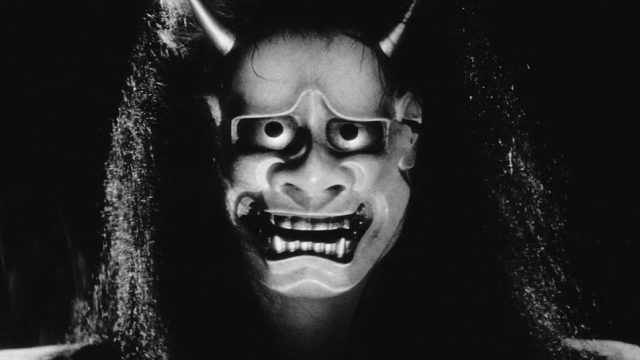The signature image of Kaneto Shindo’s Onibaba is the one I’ve used for this article: the figure in the demonic hannya mask, its features grotesquely misshapen into a look that seems to express as much grievance as anger. This is such a visually striking film, however, that there are at least two images that feel like they should be just as iconic: the field of long, rippling reeds, made eerier by the gorgeous black-and-white photography, and the pit, which feels like an intrusion from some myth.
Onibaba is entrenched in practicality, however, so all three of these spiritually-tinged, otherworldly images are used for mundane and even depressing purposes. The pit, for example, serves as a place to dispose of the bodies of the samurai the woman and her daughter-in-law rob and murder; it feels like it should be bottomless, a hole into darkness itself, but the film eventually climbs down into it, amidst all the picked-clean bones.
There’s an ongoing war–a squabble between nobles that no one else is invested in, even though they’re conscripted to die for it–and the nameless older woman and her equally nameless daughter-in-law have been scraping by via murdering lone samurai and selling their armor. When their neighbor Hachi returns–bringing the news that the young woman’s husband has been killed in battle–their grim status quo gets shaken up. This is a world where nearly all the men have names, but the women are defined only by their relationships … and now the relationships are changing. Hachi draws the younger woman into a passionate, earthy affair, one the movie imbues with an exuberant and almost pungent eroticism. The younger woman’s loyalty to him soon threatens to outweigh her loyalty to her dead husband and his mother, endangering the older woman’s violent livelihood. She hatches a plan to keep her daughter-in-law close to home.
It’s a simple plot, one based on a parable and told with a parable’s simplicity. That’s the kind of approach that would normally get called “stark,” but instead, Onibaba feels luxuriant. It manages this fantastic (in the oldest sense of the word) sense of coexisting spheres of reality, mundane and mythic; they shift so that we look through one glass, then another, then both at once. It’s a fascinating film–both genuinely and deceptively simple.
Onibaba is streaming on the Criterion Channel and HBO Max.

